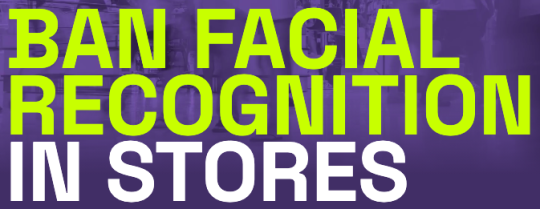Civil Rights Groups Call on Stores to Reject Facial Recognition
FOR IMMEDIATE RELEASE: Wednesday, July 14, 5:30 am ET
Contact: Caitlin Seeley George, caitlin@fightforthefuture.org
As Albertsons, Lowes, and Macy’s continue to use facial recognition in stores, groups demand retailers prioritize rights and safety of shoppers and workers

More than 35 organizations are calling for retailers to not use facial recognition on customers or workers in their stores, saying that peoples’ faces should not be scanned, stored, or sold just because they walk into or work at a store.
The campaign, launched last month by Fight for the Future, includes a scorecard with information on whether or not some of the largest retailers in the United States use facial recognition.
There are endless ways that facial recognition can be used by stores in ways that harm people: someone who participated in a protest could be included in a database of people banned from a store; an algorithm could wrongfully accuse a person with a physical disability of being intoxicated and security could throw that person out; a shopper who relies on SNAP could be flagged as low priority for customer support; a worker could be tracked all day and disciplined for taking too many bathroom breaks; a store could voluntarily hand all of its data over to government entities like ICE (in fact, according to Senator Ron Wyden, the Pentagon is already using surveillance data purchased from corporations to evade warrant requirements).
Facial recognition vendors have even used the pandemic to expand use of the technology, calling it a hands-free option for everything from paying for products to taking temperatures. And Stripe, one of the most ubiquitous payment processing tools, recently launched a product that allows anyone to add facial recognition to their website with three lines of code.
“Companies say they offer facial recognition in the name of “convenience” and “personalization,” but their real priorities are protecting and predicting their profits, ignoring how they abuse peoples’ rights and put them in danger,” said Caitlin Seeley George (she/her), campaign director at Fight for the Future. “The stores that are using or are considering using facial recognition should pay attention to this call from dozens of leading civil rights and racial justice organizations who represent millions of people. Retailers should commit to not using facial recognition in their stores so we can champion their decision, or be prepared for an onslaught of opposition.”
“Face surveillance in stores is an assault on our human rights,” said Jennifer Brody (she/her), U.S. Advocacy Manager at Access Now. “Corporations’ attempts to determine what demographic ‘box’ we fit into based on our facial features and expressions is a clear invasion of privacy. These surveillance systems perpetuate systemic discrimination, and must be stopped.”
“Detroiters know what it feels like to be watched, to be followed around by surveillance cameras using facial recognition,” said Tawana Petty (she/they), National Organizing Director at Data for Black Lives. “In Detroit, we suffer under Project Green Light, a mass surveillance program that utilizes more than 2000 flashing green surveillance cameras at over 700 businesses, including medical facilities, public housing and eating establishments. These cameras using facial recognition are monitored at real-time crime centers, police precincts and on officers’ mobile devices 24/7. It’s difficult to explain the psychological toll it takes on a community, knowing that your every move is being monitored by a racially biased algorithm with the power to yank your freedom away from you. We must ban facial recognition from stores and get this invasive technology out of every aspect of our lives. At Data for Black Lives we say No More Data Weapons. Our data, biometric or otherwise should never be weaponized against us.”
“More and more, police use private facial recognition partnerships to avoid surveillance bans,” said Albert Fox Cahn, Executive Director of the Surveillance Technology Oversight Project (S.T.O.P.). “In cities that ban government facial recognition, officers turn to corporate partners to run searches for them. When we let stores spy on their customers with facial recognition, it puts BIPOC communities in harm’s way. Every time a biased facial recognition search increases the risk that a customer will be arrested just for ‘shopping while black.’ A trip to the grocery store shouldn’t mean losing your privacy and enduring police profiling.”
Tracy Rosenberg (she/her), Advocacy Director at Oakland Privacy, added that “Consumers should not have to cross the gauntlet of flawed and intrusive face surveillance just to buy the products they want. We should not be tracked and identified every time we browse in a bookstore or check out the price of a cute shirt. This biased software has already put people in jail for crimes they did not commit. Being vetted for our suitability to shop is an authoritarian nightmare, not the free and democratic society we want and expect.”
“Consumers should be able to browse anonymously in stores, free of surreptitious attempts to identify and profile them,” said Susan Grant, Director of Consumer Protection and Privacy at Consumer Federation of America. “This type of commercial surveillance is un-American and unwarranted.”
Al Smith (they/them), from The Tor Project, added, “Constant surveillance, tracking, and data collection infringes on our human right to privacy. Consumers and employees should be able to enter stores without fearing that facial recognition software will be cataloging their every move.”
The full list of organizations signed on are: 18 Million Rising, Access Now, Action Center on Race and the Economy, Consumer Federation of America, Council on American-Islamic Relations (CAIR), Data for Black Lives, Demand Progress, Encode Justice, Electronic Privacy Information Center (EPIC), Fairplay, Fight for the Future, Free Press, Jewish Voice for Peace, Jobs with Justice, Just Futures Law, Kairos Action, Lucy Parsons Labs, Mijente, Muslim Justice League, National Center for Transgender Equality, National Immigration Law Center, National Lawyers Guild, Oakland Privacy, Open Media, PDX Privacy, Popular Resistance, Presente.org, Public Citizen, Raices Texas, Restore the Fourth, Roots Action, Secure Justice, Students for Sensible Drug Policy, Surveillance Technology Oversight Project (S.T.O.P.), The Tor Project, X-Lab.
